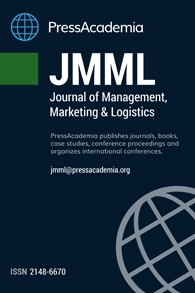ROLE OF TOURISM ON FOREIGN EXCHANGE OF DEVELOPING COUNTRIES AND CASE OF TURKEY
ROLE OF TOURISM ON FOREIGN EXCHANGE OF DEVELOPING COUNTRIES AND CASE OF TURKEY
Balance of payments, foreign exchange, tourism, Turkey ARDL,
___
- Ardahaey, T.F. 2011, “Economic impacts of tourism industry”, International Journal of Business and Management, vol. 6, vo. 8, pp. 206-215.
- Airey, D. 1978, “Tourism and the balance of payments”. Tourism International Research – Europe. 3rd quarter. 2-16. In Mathieson, A. and Wall, G. 1992. Tourism. Economic, Physical and Social Impacts. Essex: Addison Wesley Longman Limited.
- Ataç, B. 1990, Maliye Politikaları, Anadolu Üniversitesi, Eğitim, Sağlık ve Bilimsel Araştırmaları Vakfı Yayınları, No:86, Eskişehir.
- Barutçugil, İ.S. 1986, Turizm Ekonomisi ve Turizmin Türk Ekonomisindeki Yeri, Beta Basım Yayım Dağıtım A.Ş, İstanbul.
- Bozkurt, H. 2007, Zaman Serileri Analizi, Ekin Kitabevi, Bursa.
- Bukart, A.J. &Medlik, S. 1981, Tourism: Past, Present and Future, William Heineman Ltd., London, UK.
- Chavez, A. 2015, International tourism as a source of foreign exchange for Mexico, TURyDES: Revista Turismo y Desarrollo local, vol. 8, no.19, Malaga: Universidad de Málaga.
- Cortes-Jimenez, I., Pulina, M., Prunera, C.R. & Artis, M. 2009, “Tourism and exports as a means of growth” Research Institute of Applied Economics, Working Papers 2009/10, pp. 1-28.
- Çelik. K.A., Özcan, S., Topçuoglu, A. & Yildirim. K.E. 2013, “ Effects of the tourism industry on the balance of payments deficit”, Anatolia: An International Journal of Tourism and Hospitality Research, vol.24, no.1, 86-90.
- Erdoğan, H. 1996, Uluslararası Turizm, Uludağ Üniversitesi Basımevi, Bursa.
- Griffith, W. 2002, “A tale of four CARICOM countries”, Journal of Economic Issues, vol. 36, no.1, pp. 79-106.
- Göçer, İ. (2011), Türkiye Ödemeler Bilançosu Dengesinin Sürdürülebilirliği: Sınır Testi Yaklaşımı, Dumlupınar Üniversitesi Sosyal Bilimler Dergisi, 29, 263-278.
- Gujarati, N.D. 1999, Temel Ekonometri, çev. Ü. Şenesen& G. G. Şenesen, Literatür Yayıncılık, İstanbul.
- IMF (The International Monetary Fund) 2016, World Economic Outlook Report and Database October 2016, http://www.imf.org/external/pubs/ft/weo/2016/02/index.htm
- İlkin, A. 1998, Kalkınma ve Sanayi Ekonomisi, Yön Ajans, İstanbul.
- İlkin, A. ve Dinçer, M.Z. 1991, Turizm Kesiminin Turizm Ekonomisindeki Yeri ve Önemi, TOBB Yay. No: 217, Ankara.
- Juliusdottir, H.V. 2012. “Iceland‘s tourism satellite account; The inconsistency between balance of payments statistics and tourism statistics”. 11th Global Forum on Tourism Statistics, 14 To 16 November 2012, Reykjavík, Iceland, Session 5: Coherence and Comparability of Tourism Statistics, pp. 1-18.
- Kar, M., Zorkirişçi E. & Yıldırım, M. 2004, “Turizmin Ekonomiye Katkısı Üzerine Ampirik Bir Değerlendirme”, Akdeniz Üniversitesi İktisadi ve İdari Bilimler Fakültesi Dergisi, cilt 4, sayı 8, ss. 87-112.
- Kareem, O.I.2008, “Tourism-Exports and Economic Growth in Africa”, 13th African Econometrics Society Confrence, Pretoria, Africa, pp. 1-31.
- Olalı, H. ve Timur, A. 1988, Turizm Ekonomisi, Ofis Tic. Matbaacılık. San. Ltd. Şti., İzmir.
- Nowak, J.J. & Sali, M. 2008. “Tourism, capital good imports and long-run growth”, Wellintong: Economic Research Forum, working paper series, No.382, pp. 1-19.
- Nowak, J.J., Sali, M. & Cortes-Jimenez, I. 2007, “Tourism, capital good imports and economic growth: Theory and evidence for Spain”, Tourism Economics, vol. 13, no. 4, pp. 515-536.
- Mihalic, T. 2002, “Tourism and economic development issues”, In: Sharply, R., Tefler, D.J.. (Eds.), Tourism and Development : Concepts and Issues, Channel View Publications, Clevedon, UK, pp. 81-111.
- Petrevska, B. 2011, “Tourism in the global development strategy of Macedonia: Economic perspectives”, UTMS Journal of Economics, vol. 2 no.1, pp. 101-108.
- Pesaran, H.M., Shin, Y. & Smith, R.J. 2001, “Bound testing approaches to the analysıs of level relationships”, Journal of Applied Econometrics, vol. 16, pp. 239-326.
- Purwomarwanto, Y.L. & Ramachandran, J. 2015, Performance of tourism sector with regard to the global crisis - a comparative study between Indonesia, Malaysia and Singapore, The Journal of Developing Areas, vol. 49, no. 4, pp. 325-339.
- Savaş, V. 1991, Kalkınma Ekonomisi, Beta Basım Yayım Dağıtım A.Ş., İstanbul.
- Sinclair, M.T. & Bote Gomez, V. 1996, “Tourism, the Spanish economy and the balance of payments”, in M. Barke, M. Newton & J. Towner (eds.), Tourismin Spain: Critical Perspectives, Wallingford: CAB International, chapter 4.
- Sugiyarto, G., Blake, A. & Sinclair M.T. 2003, “Tourism and globalizatİon: Economic impact in Indonesia”, Annals of Tourism Research, vol. 30, no. 3, pp. 683-701.
- Şahin, A. 1990, İktisadi Kalkınmadaki Önemi Bakımından Türkiye’de Turizm Sektöründeki Gelişmelerin Değerlendirilmesi, TOBB Yayın No:149, Ankara.
- Thano, R. 2015, “The impacts of Tourism on the balance of payments”, American Journal of Economics, Finans and Management, vol. 1, no. 5, pp. 529-536.
- Ülgener, S.,1991, Milli Gelir, İstihdam ve İktisadi Büyüme, Der Yayınları, 7. Baskı, İstanbul.
- WTTC (The World Travel & Tourism Council) 2017, Travel & Tourism Economic Impact, https://www.wttc.org/-/media/files/reports/economic-impact-research/regions-2017/world2017.pdf.
- Wu, J-L. 2000, “Mean reversionofthe currentaccount: Evidence from panel data unit-root test”, Economic Letters, vol. 66, pp. 215–222.
- Yapar Saçık, S. & Karaçayır, E. 2015, “Türkiye’de cari işlemler hesabının finansmanı: ARDL sınır testi yaklaşımı” Selçuk Üniversitesi Sosyal Bilimler Dergisi, sayı: 33, ss. 155-166.
- Yarcan, Ş. 1996, Türkiye’de Turizm ve Uluslararasılaşma, Boğaziçi Üniversitesi Basımevi, İstanbul.
- Zaei, E.M. & Zaei, E.M. 2013, “The impacts of tourism industry on host community”. European Journal of Tourism Hospitality and Research, Vol.1, No.2, pp.12-21.
- Zivot, E. & Andrews, D. W. 1992, “Further evidence on the great crash, the oil-price shock and the unit-root hypothesis”, Journal of Business and Economic Statics, vol.10, pp.251-270.
- Yayın Aralığı: Yılda 4 Sayı
- Başlangıç: 2014
- Yayıncı: PressAcademia
THE EFFECT OF PERCEIVED VALUE ON BEHAVIOURAL INTENTIONS
THE EFFECT OF SUPPLY CHAIN COLLABORATION ON SUPPLY CHAIN PERFORMANCE
ROLE OF TOURISM ON FOREIGN EXCHANGE OF DEVELOPING COUNTRIES AND CASE OF TURKEY
MOBILE ADVERTISING EFFECT: INVESTIGATING FACTORS AFFECTING THE USAGE OF MOBILE PAYMENT
Ching-Wei Ho, Yu-Bing Wang, Chun Hao Fang
